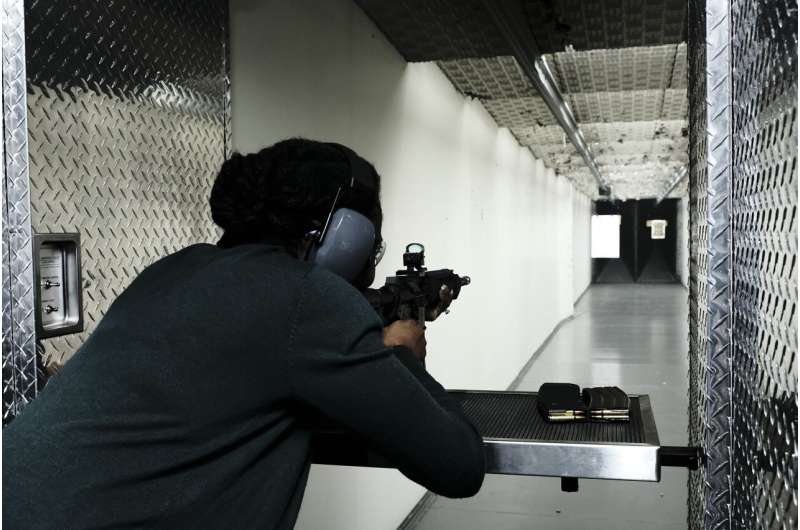This article has been reviewed according to Science X's editorial process and policies. Editors have highlighted the following attributes while ensuring the content's credibility:
fact-checked
peer-reviewed publication
trusted source
proofread
Virtual reality as a reliable shooting performance-tracking tool

Virtual reality technology can do more than teach weaponry skills in law enforcement and military personnel, a new study suggests: It can accurately record shooting performance and reliably track individuals' progress over time.
In the study of 30 people with a range of experience levels in handling a rifle, researchers at The Ohio State University found that a ballistic simulator captured data on the shooters' accuracy, decision-making and reaction time—down to the millimeter in distance and millisecond in time—on a consistent basis.
In addition to confirming that the simulator—called the VirTra V-100—is a dependable research tool, the findings could lead to establishing the first-ever standardized performance scores for virtual reality ballistics training.
"To our knowledge, we're the first team to answer the question of whether the simulator could be converted to an assessment tool and if it's credible to use it day-to-day," said Alex Buga, first author of the study and a Ph.D. student in kinesiology at Ohio State.
"We've figured out how to export the data and interpret it. We've focused on the three big challenges of marksmanship, decision-making and reaction time to measure 21 relevant variables—allowing us to put a report in a user's hand and say, 'This is how accurate, precise, focused and fast you are.'"
The study was published in the Journal of Strength and Conditioning Research.
U.S. military leaders and law enforcement agencies have shown an interest in increasing the use of virtual reality for performance assessment, said Buga and senior study author Jeff Volek, professor of human sciences at Ohio State. Earlier this year, an Ohio Attorney General Task Force on the Future of Police Training in Ohio recommended incorporating virtual reality technology into training protocols.
Volek is the principal investigator on a project focused on improving the health of military service members, veterans and the American public. As part of that initiative, the research team is investigating the extent to which nutritional ketosis reduces detrimental effects of sleep loss on cognitive and physical performance in ROTC cadets—including their shooting ability as measured by the VirTra simulator. Verifying the simulator's results for research purposes triggered the attempt to extract and analyze its data.
"We were using it as an outcome variable for research, and we found that it has very good day-to-day reproducibility of performance, which is crucial for research," Volek said. "You want a sensitive and reproducible outcome in your test where there's not a lot of device or equipment variation."
Because the lab also focuses on human performance in first responders, researchers' conversations with military and law enforcement communities convinced Buga that data collected by the simulator could be more broadly useful.
"I created a few programs that enabled us to calculate the shooting data and produce objective training measures," he said. "This equipment is close to what the military and police use every day, so this has potential to be used as a screening tool across the country."
Users of the simulator operate the infrared-guided M4 rifle by shooting at a large screen onto which different digitally generated visuals are projected—no headset required. The rifle at Ohio State has been retrofitted to produce the same recoil as a police or military weapon.
The study participants included civilians, police and SWAT officers, and ROTC cadets. Each was first familiarized in a single learning session with the simulator and then completed multiple rounds of three different tasks in each of three study performance sessions.
In the first task, participants fired at the same target a total of 50 times to produce measures of shooting precision. The decision-making assessment involved shooting twice within two seconds at designated shapes and colors on a screen displaying multiple shape and color choices. In the reaction-time scenario, participants shot at a series of plates from left to right as rapidly as possible.
Internal consistency ratings showed the simulator generated good to excellent test-retest agreement on the 21 variables measured.
All participants were well-rested and completed the study sessions at about the same time of day. Self-evaluations showed that participants' overall confidence about their shooting performance increased from their first to final sessions. They also rated the simulator as a realistic and a low-stress shooting assessment tool.
The low stress and well-rested conditions were important to establishing baseline performance measures, the researchers noted, which then would enable evaluating how injuries and other physical demands of first-responder professions affect shooting performance.
"This simulator could be used to assess the effectiveness of specific training programs designed to improve shooting performance, or to evaluate marksmanship in response to various stressors encountered by the same law enforcement and military personnel," Buga said. "These novel lines of evidence have enabled us to push the boundaries of tactical research and set the groundwork for using virtual reality in sophisticated training scenarios that support national defense goals."
Additional co-authors, all from Ohio State, included Drew Decker, Bradley Robinson, Christopher Crabtree, Justen Stoner, Lucas Arce, Xavier El-Shazly, Madison Kackley, Teryn Sapper, John Paul Anders and William Kraemer.
More information: Alex Buga et al, The VirTra V-100 Is a Test-Retest Reliable Shooting Simulator for Measuring Accuracy/Precision, Decision-Making, and Reaction Time in Civilians, Police/SWAT, and Military Personnel, Journal of Strength & Conditioning Research (2024). DOI: 10.1519/JSC.0000000000004875




















